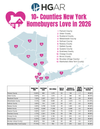WASHINGTON, DC—The National Multifamily Housing Council reported today that apartment market conditions weakened in the National Multifamily Housing Council’s (NMHC) Quarterly Survey of Apartment Market Conditions for April 2020, as the industry confronts the ongoing COVID-19 pandemic. The Market Tightness (12), Sales Volume (6), Equity Financing (13), and Debt Financing (20) indexes all came in well below the breakeven level (50).
“Residents across the country are currently under directives to stay at home and practice social distancing in order to contain the spread of COVID-19. As a result, much of the nation’s economic activity has been put on hold,” noted NMHC Chief Economist Mark Obrinsky. “With upwards of 20 million Americans now out of work, it is not surprising that 82% of respondents reported looser market conditions this quarter, and that just 5% observed a tighter market.”
“In the market for apartment sales, many respondents appear to have adopted the ‘wait-and-see’ attitude, noting that COVID-19 has created too much uncertainty around asset pricing for much of any transactions to occur. There are some buyers out looking for deals at the moment, but few sellers are willing to adjust prices downward. Only 1% of respondents reported higher sales volume, the lowest on record since 2008.”
The Market Tightness Index decreased from 48 to 12, indicating looser market conditions. The vast majority (82%) of respondents reported looser market conditions than three months prior, compared to 5% who reported tighter conditions. A small portion (12%) of respondents felt that conditions were no different from last quarter.
The Sales Volume Index slid from 43 to 6, with 90% of respondents reporting lower sales volume than three months prior. While a small group of respondents (5%) deemed sales volume unchanged, a mere 1% of respondents reported higher sales volume.
The Equity Financing Index dropped from 61 to 13, the first quarter of the last 10 to mark worse conditions for the equity market. Seventy-five% of respondents reported that equity financing was less available than in the three months prior, while no respondents believed equity financing was more available, several respondents (15%) thought that conditions were unchanged in the equity market.
The Debt Financing Index dipped from 68 to 20, with nearly three-quarters (71%) of respondents reporting worse conditions for debt financing compared to the three months prior, while just 10% felt that financing conditions were more favorable. A number of respondents (10%) felt that conditions were unchanged in the debt market.
The National Multifamily Housing Council in another survey released today found that 89% of apartment households made a full or partial rent payment by April 19 in its survey of 11.5 million units of professionally managed apartment units across the country, up 5%age points from April 12.

Source: National Multifamily Housing Council
NMHC’s Rent Payment Tracker numbers also examined historical numbers and found that 93% of renters made full or partial payments from April 1-19, 2019, and 93% of renters in March 1-19, 2020. The latest tracker numbers reflect a payment rate of 95% compared to the same time last month. These data encompass a wide variety of market-rate rental properties, which can vary by size, type and average rental price.
“It is encouraging that apartment residents continue to meet their rent obligations whether that’s with the support of the federal relief funds, credit cards and alternative, flexible options provided by the industry’s owners and operators,” said NMHC President Doug Bibby. “But their financial security is unclear as many may not qualify for federal relief, while others are drawing down savings and facing greater financial challenges, including higher health care costs. For that reason, lawmakers need to act now to enact a direct renter assistance program.”
“We are committed to working with our residents as federal relief funds begin flowing,” said David Schwartz, NMHC Chair and CEO and Chairman of Chicago-based Waterton. “But that is happening on very different timetables across the country as states struggle to keep up with unemployment that approaches Great Depression levels. While April rent payments were better than anticipated, clearly, there are significant macroeconomic risks that require lawmakers to provide residents with the resources they need for household essentials such as food, shelter and healthcare.”
The NMHC Rent Payment Tracker metric providers insight into residents’ financial health over the course of each month, and, as the dataset ages, between months. However, noteworthy technical issues may make historical comparisons imprecise. For example, factors such as varying days of the week on which data are collected; individual companies’ differing payment collection policies; shelter-in-place orders’ effects on residents’ ability to deliver payments in person or by mail; the closure of leasing offices, which may delay operators’ payment processing; and other factors can affect how and when rent data is processed and recorded.
Total unit counts may change as units are leased or vacated and survey methodology is refined, according to the NHMC.









